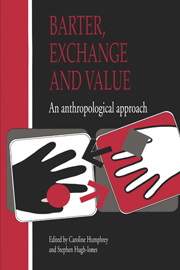
-
Select format
-
- Publisher:
- Cambridge University Press
- Publication date:
- 05 June 2012
- 11 June 1992
- ISBN:
- 9780511607677
- 9780521406826
- Dimensions:
- Weight & Pages:
- Dimensions:
- (234 x 158 mm)
- Weight & Pages:
- 0.355kg, 212 Pages
You may already have access via personal or institutional login
Book description
This book concerns barter, a transaction in which objects are exchanged directly for one another without the use of money. Economists treat barter as an inefficient alternative to market exchange, and assume that it is normal only in 'primitive' economies or marks the breakdown of more developed exchange mechanisms. For their part, anthropologists have been more interested in the social and moral complexities of the 'gift', and treat barter dismissively as mere haggling. The authors of this collection do not accept that barter occupies a residual space between monetary and gift economies. Using accounts from different parts of the world, they aim to demonstrate that it is more than a simple and self-evident economic institution. Barter may constitute a mode of exchange with its own social characteristics occupying a specific moral space. This novel treatment of barter represents an original and topical addition to the literature on economic anthropology.
Contents
Metrics
Altmetric attention score
Full text views
Full text views help Loading metrics...
Loading metrics...
* Views captured on Cambridge Core between #date#. This data will be updated every 24 hours.
Usage data cannot currently be displayed.
Accessibility standard: Unknown
Why this information is here
This section outlines the accessibility features of this content - including support for screen readers, full keyboard navigation and high-contrast display options. This may not be relevant for you.
Accessibility Information
Accessibility compliance for the PDF of this book is currently unknown and may be updated in the future.


